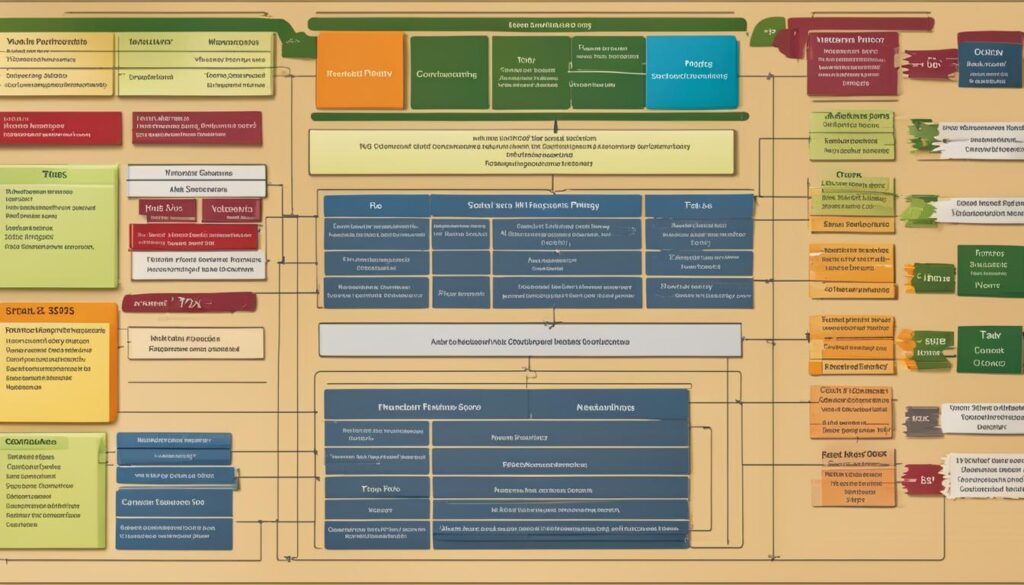Retirement planning is a crucial aspect of ensuring long-term financial security. As you enter your 70s, it becomes even more important to focus on tax efficiency and planning to maximize your wealth accumulation and minimize your tax liability. By incorporating tax-efficient strategies into your retirement plan and regularly consulting with a financial advisor, you can optimize your investment portfolio and ensure a stable financial future.
One of the key strategies for tax efficiency is portfolio rebalancing. This involves adjusting your asset allocation to maintain your desired risk level. Another important strategy is tax loss harvesting, which involves selling underperforming assets to offset capital gains and reduce your tax bill. These strategies can help increase your wealth accumulation, lower your taxable income, and provide financial security for your golden years.
It is essential to be proactive in your tax planning and adapt to changing market conditions and tax laws. Regularly consulting with a financial advisor can help you stay on track and make informed decisions. With proper tax-efficient planning, you can ensure that your retirement years are financially stable and enjoyable.
Key Takeaways:
- Focus on tax efficiency and planning in your 70s to maximize wealth accumulation and minimize tax liability.
- Portfolio rebalancing and tax loss harvesting are crucial strategies for tax efficiency.
- Consult with a financial advisor to stay informed about changing market conditions and tax laws.
- Tax-efficient planning can provide long-term financial security for your retirement years.
- Implementing tax-efficient strategies can increase wealth accumulation and lower taxable income.
The Benefits of Portfolio Rebalancing
As you approach retirement, it’s important to ensure that your investment portfolio remains aligned with your financial goals and risk tolerance. This is where portfolio rebalancing comes into play. By regularly rebalancing your portfolio, you can maintain your desired asset allocation and mitigate potential risks.
Portfolio rebalancing involves selling overperforming assets and buying underperforming assets to bring your portfolio back in line with your original goals. For example, if your target asset allocation is 60% stocks and 40% bonds, but due to market fluctuations, stocks now represent 70% of your portfolio, rebalancing will involve selling some stocks and buying more bonds to maintain the desired 60/40 split.
This strategy helps ensure that your portfolio doesn’t become too risky as you get closer to retirement. By periodically reviewing and adjusting your asset allocation, you can protect yourself against market volatility and potentially maximize your returns. Rebalancing also allows you to take advantage of market trends and opportunities, ensuring that your investment portfolio reflects your evolving financial situation.
The Benefits of Portfolio Rebalancing:
- Maintains your desired asset allocation
- Reduces the risk of your portfolio becoming too imbalanced
- Protects against market volatility
- Allows you to take advantage of market trends and opportunities
By incorporating portfolio rebalancing into your retirement planning, you can create a balanced and diversified portfolio that aligns with your risk tolerance and financial objectives. Remember to consult with a financial advisor to determine the optimal rebalancing strategy for your specific situation.
The Importance of Tax Loss Harvesting
Tax loss harvesting is a strategy that can have a significant impact on your overall tax bill. By strategically selling underperforming assets, you can generate capital losses that can be used to offset capital gains. This can result in a lower tax liability and potentially save you a substantial amount of money over time.
Implementing tax loss harvesting requires careful planning and monitoring of your investment portfolio. It’s important to identify assets that are performing poorly and decide when it’s the right time to sell them. By strategically timing these sales, you can generate losses that can be used to offset any capital gains you may have realized throughout the year.
One of the advantages of tax loss harvesting is its ability to help you maintain a balanced portfolio while minimizing your tax bill. By selling underperforming assets, you have the opportunity to reinvest the proceeds into more promising investments. This can help you optimize your investment portfolio and potentially generate higher returns in the future.
It’s important to note that tax loss harvesting is not a one-size-fits-all strategy. Your individual circumstances, including your taxable income and investment goals, will determine the best approach for implementing this strategy. Consulting with a financial advisor who specializes in tax planning can help ensure that you are maximizing the benefits of tax loss harvesting and making informed decisions that align with your long-term financial goals.
Example table: Tax Loss Harvesting Benefits
| Benefits | Description |
|---|---|
| Reduces tax liability | Tax loss harvesting allows you to offset capital gains, reducing the amount of taxes you owe. |
| Optimizes portfolio performance | By selling underperforming assets, you can reallocate your investments to potentially generate higher returns. |
| Creates tax-efficient strategy | Implementing tax loss harvesting as part of your overall tax planning can help you minimize your tax bill and increase your after-tax returns. |
| Allows for rebalancing opportunities | When you sell underperforming assets, you have the opportunity to rebalance your portfolio and maintain your desired asset allocation. |
Increasing Wealth Accumulation Through Tax-Efficient Planning
When it comes to building wealth and securing your financial future, tax efficiency plays a crucial role. By implementing tax-efficient strategies, you can maximize your investment gains, optimize your portfolio savings, and accelerate your wealth accumulation over time.
One key benefit of tax-efficient planning is the ability to minimize taxes on your investment gains. By strategically managing your investments and taking advantage of tax-saving opportunities, you can reduce the amount of taxes you owe and allocate those savings back into your portfolio. This can result in compounding growth and ultimately help you reach your financial goals sooner.
Another important aspect of tax-efficient planning is the ability to effectively allocate your resources. By understanding the tax implications of different investment strategies, you can make informed decisions that minimize your tax liabilities while still maximizing the growth potential of your investments. This allows you to optimize your overall financial picture and ensure that you are making the most of your resources.
Example Table: Tax-Efficient Strategies Comparison
Below is a table comparing different tax-efficient strategies and their potential impact on wealth accumulation:
| Strategy | Potential Impact |
|---|---|
| Tax Loss Harvesting | Reduces tax liability by offsetting capital gains with capital losses. |
| Qualified Dividend Investing | Minimizes taxes on dividend income by investing in qualified dividend stocks. |
| Tax-Advantaged Accounts | Allows for tax-free growth or tax-deferred growth on investments, depending on the account type. |
| Strategic Asset Location | Optimizes asset placement across taxable and tax-advantaged accounts to minimize taxes. |
Incorporating tax-efficient strategies into your overall financial plan can have a significant impact on your long-term wealth accumulation. By minimizing taxes and making smart investment decisions, you can increase the growth potential of your portfolio and work towards achieving your financial goals.

It’s important to consult with a financial advisor who specializes in tax planning to ensure that you are implementing the most effective strategies for your specific situation. They can help you navigate the complexities of the tax code, stay up to date on changing regulations, and provide personalized guidance to help you optimize your tax efficiency.
- Regularly review and rebalance your investment portfolio to maintain a tax-efficient asset allocation.
- Consider utilizing tax-advantaged accounts such as IRAs or 401(k)s to maximize tax savings.
- Take advantage of tax loss harvesting opportunities to offset capital gains and reduce your tax liability.
- Invest in tax-efficient assets such as index funds or ETFs that have lower taxable distributions.
By incorporating these strategies into your overall financial plan, you can increase your wealth accumulation, minimize taxes, and work towards achieving long-term financial security.
Lowering Taxable Income With Effective Tax Planning
Tax planning is a crucial component of financial management, especially when it comes to minimizing your taxable income. By employing effective tax planning strategies, you can optimize your financial situation and potentially reduce the amount you owe in taxes each year. Here, we explore some key methods to lower your taxable income and take advantage of tax credits and deductions.
Maximizing Tax Credits
One way to lower your taxable income is by maximizing the tax credits available to you. Tax credits directly reduce the amount of tax you owe, providing a dollar-for-dollar reduction in your tax liability. Some common tax credits include the Child Tax Credit, Education Credits, and the Earned Income Tax Credit. By carefully reviewing the eligibility criteria and taking advantage of applicable tax credits, you can significantly lower your taxable income.
Utilizing Tax Deductions
An effective tax planning strategy involves utilizing tax deductions to lower your taxable income. Tax deductions reduce the amount of your income that is subject to tax, potentially putting you in a lower tax bracket. Deductions can include expenses related to healthcare, education, homeownership, and charitable contributions. By keeping accurate records and consulting with a tax professional, you can identify the deductions available to you and maximize their impact on your taxable income.
Strategic Income and Expense Management
To further lower your taxable income, strategic management of your income and expenses is essential. By strategically timing when you receive income and when you incur expenses, you can optimize your tax situation. For example, if you anticipate a significant income increase in the next tax year, you may want to defer receiving that income until the following year to minimize its impact on your taxable income. Similarly, by strategically timing deductible expenses, such as medical procedures or business expenses, you can effectively lower your taxable income.
| Tax Planning Strategies | Benefits |
|---|---|
| Maximizing tax credits | Direct reduction in tax liability |
| Utilizing tax deductions | Lowering taxable income by reducing taxable amount |
| Strategic income and expense management | Optimizing timing of income and deductible expenses |
Tax planning can play a vital role in reducing your taxable income and maximizing your potential tax savings. By employing strategies such as maximizing tax credits, utilizing tax deductions, and strategically managing your income and expenses, you can effectively lower your tax liability and keep more money in your pocket. However, it’s crucial to consult with a qualified tax professional or financial advisor to ensure you are implementing these strategies correctly and in compliance with applicable tax laws.

Ensuring Long-Term Financial Security
When it comes to planning for your retirement, ensuring long-term financial security is paramount. Building a retirement nest egg that can support your desired lifestyle during your golden years requires careful consideration and strategic decision-making. By implementing tax-efficient planning strategies, you can maximize your savings and create a solid financial foundation for the future.
One of the key components of long-term financial security is minimizing your tax burden. By optimizing your tax situation, you can have more money available to save for retirement and invest in your future. This can be achieved through effective tax planning strategies, such as taking advantage of tax credits and deductions that may be available to you.
By consulting with a financial advisor, you can gain valuable insights and guidance on how to navigate the complex world of taxes and retirement planning. They can help you develop a customized plan that aligns with your specific goals and objectives, ensuring that you are taking full advantage of all available opportunities to maximize your savings and minimize your tax liability.
Ultimately, the goal of ensuring long-term financial security is to provide you with the peace of mind that comes with knowing you have taken the necessary steps to secure your financial future. By prioritizing tax-efficient planning and working with a trusted advisor, you can create a roadmap that will guide you towards a comfortable and fulfilling retirement.

How Can Tax Efficiency and Planning Help with Smart Budgeting and Expense Management in Your 70s?
As you enter your 70s, smart budgeting in 70s becomes essential for managing expenses. Tax efficiency and planning can help stretch your retirement savings further. By strategically managing withdrawals from different accounts and taking advantage of tax-advantaged accounts, you can minimize the impact of taxes on your overall budget.
Conclusion
Tax efficiency is a vital component in achieving maximum retirement savings and securing your financial future. By incorporating strategies such as portfolio rebalancing and tax loss harvesting into your retirement plan, you can optimize your investment portfolio and minimize your tax liability. Working closely with a knowledgeable financial advisor is essential to staying informed about changing tax laws and market conditions.
Regular consultations with a financial advisor will ensure that your retirement plan remains on track and adapts to any necessary adjustments. With proactive planning and effective tax strategies, you can confidently navigate the complexities of retirement planning and achieve long-term financial success.
Remember, tax-efficient planning offers significant benefits, including increased wealth accumulation, lower taxable income, and ultimately, long-term financial security. By integrating these tax strategies into your retirement plan, you can make the most of your resources and enjoy a comfortable retirement lifestyle. Stay proactive, consult with a financial advisor, and secure your future through smart tax planning.
FAQ
What is portfolio rebalancing?
Portfolio rebalancing involves adjusting your asset allocation to maintain your desired risk level.
How does tax loss harvesting work?
Tax loss harvesting involves selling underperforming assets to offset capital gains and reduce your tax bill.
What are the benefits of tax-efficient planning?
Tax-efficient planning can increase wealth accumulation, lower taxable income, and provide long-term financial security.
Why is regularly consulting with a financial advisor important?
Regularly consulting with a financial advisor helps you stay on track and adapt to changing market conditions and tax laws.
Why is portfolio rebalancing important for retirement planning?
Portfolio rebalancing ensures that your portfolio doesn’t become too risky as you approach retirement.
How can tax loss harvesting save me money?
Tax loss harvesting allows you to offset capital gains and reduce your tax liability.
How does tax-efficient planning increase wealth accumulation?
By minimizing taxes on your investment gains, you can reinvest those savings back into your portfolio and accelerate your wealth accumulation.
What are the benefits of lowering taxable income?
Lowering taxable income can make you eligible for tax credits and deductions, reducing your overall tax liability.
How does tax-efficient planning ensure long-term financial security?
By reducing your tax burden, you can have more money available to save for retirement, building a substantial nest egg for your golden years.

